WORD PRPBLEMS ON RELATED RATES
Problem 1 :
An airplane is flying towards a radar station at a constant height of 6 km above the ground. If the distance s between the airplane and the radar station is decreasing at a rate of 400 km per hour when s = 10 km, what is the horizontal speed of the plane ?
Solution :
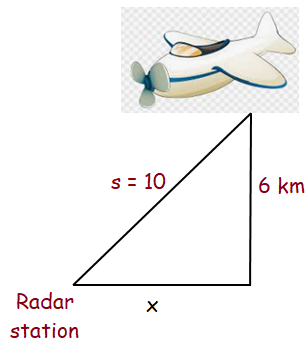
Using Pythagorean theorem :
Distance between airplane and radar station = s
Horizontal distance = x, height of airplane = 6 km
x2 + 62 = s2 -----(1)
x2 + 62 = 102
x2 + 62 = 102
x2 = 100 - 36
x2 = 64
x = 8
Differentiating (1) with respect to t, we get
Problem 2 :
A light is on the ground 20 m from building. A man 2 m tall walks from the light directly toward the building at 1 m/s. How fast is the length of his shadow on the building changing when he is 14 m from the building ?
Solution :
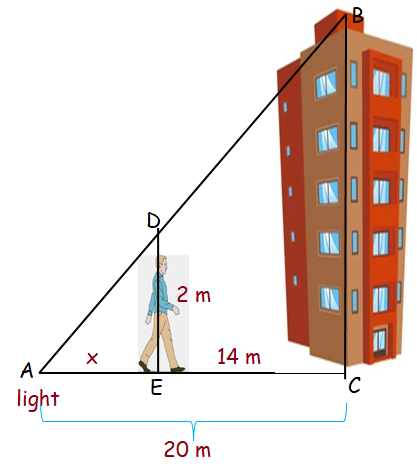
Let height of the building (BC) = h
In the picture above, we see two right triangles and they are similar.
2/h = x/20
xh = 40 ---(1)
When x = 6
h = 40/6
h = 20/3
Here x will change while the man is walking towards the building.
differentiating with respect to "t"
x(dh/dt) + h (dx/dt) = 0
dx/dt = 1 m/s, h = 20/3 and x = 6
6(dh/dt) + (20/3) (1) = 0
dh/dt = (-20/3) / 6
dh/dt = -10/9 m/s
Problem 3 :
A conical cup is 4 cm across and 6 cm deep. Water leaks out of the bottom at the rate of 2 cm3/sec. How fast is the water dropping when the height of the water is 3 cm?
Solution :
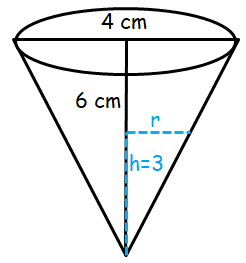
Let R be radius of conical cup and H be the height.
After the leakage r be the radius and h be the height.
While leakage happened, there will be a change in quantity of water in the cup.
V = (1/3)π r2h ----(1)
R = 2, H = 6, r = ? when h = 3
R/H = r/h
2/6 = r/3
r = 6/6
r = 1
r : h = 1 : 3
r/h =1/3
r = h/3
Applying the value of r in (1) to make the function only in terms of h, we get
V = (1/3)π (h/3)2h
V = (1/3)π (h3/9)
V = (h3/27)π
Differentiating with respect to "t", we get
dV/dt = (3h2π/27) dh/dt
dV/dt = (h2π/9) dh/dt
Given details :
dV/dt = -2 cm3/sec, dh/dt = ? when h = 3
-2 = (32π/9) dh/dt
-2/π = dh/dt
dh/dt = -2/π cm/s
Problem 4 :
Air is escaping from a spherical balloon at the rate of 2 cm3 per minute. How fast is the surface area shrinking when the radius is 1 cm?
V = 4/3 πr3 and S = 4πr2
where V is the volume and S is the surface area, r is the radius.
Solution :
V = 4/3 πr3
Differentiating with respect to t, we get
dV/dt = 4/3 π(3r2) (dr/dt)
When r = 1, dV/dt = -2 cm3 per minute
-2 = (4/3) π(3(1)2) (dr/dt)
(dr/dt) = -2/4π
(dr/dt) = -1/2π
S = 4πr2
Differentiating with respect to t.
dS/dt = 4π(2r)(dr/dt)
dS/dt = 8πr (dr/dt)
When r = 1, dr/dt = -1/2π
dS/dt = 8π(1)(-1/2π)
dS/dt = -4π cm2/min
Problem 5 :
A funnel in the shape of an inverted cone is 30 cm deep and has a diameter across the top of 20 cm. Liquid is flowing out of the funnel at the rate of 12 cm3 /sec. At what rate is the height of the liquid decreasing at the instant when the liquid in the funnel is 20 cm deep?
Solution :
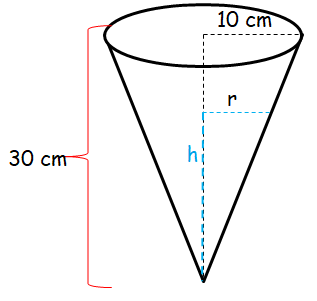
Volume of liquid in the funnel (V) = (1/3)πr2 h
In the above cone, the triangles are similar.
r/h = 10/30
r = 10h/30
r = h/3
V = (1/3)π(h/3)2 h
V = (1/27)πh3
dV/dt = (1/27)π(3h2) (dh/dt)
dV/dt = 12 cm3/sec, h = 20
12 = (1/9) π (20)2(dh/dt)
dh/dt = 12 (9)/400π
dh/dt = 27/100π cm/sec
Problem 6 :
Find the rate of change of the area A, of a circle with respect to its circumference C.
Solution :
Area of circle (A) = πr2
Circumference of circle (C) = 2πr
r = C/2π
A = π(C/2π)2
A = C2/4π
dA/dC = 2C/4π
dA/dC = C/2π
Problem 7 :
A boat is being pulled into a dock by attached to it and passing through a pulley on the dock, positioned 6 meters higher than the boat. If the rope is being pulled in at a rate of 3 meters/sec, how fast is the boat approaching the dock when it is 8 meters from the dock?
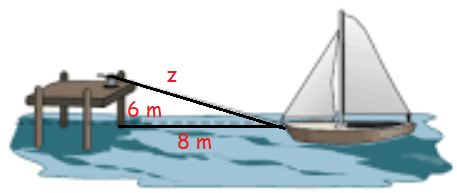
Solution :
Let x be the horizontal distance between dock and boat.
Let z be the length distance from dock and boat.
Both z and x are changing with respect to time.
x2 + 62 = z2 ----(1)
62 + 82 = z2
z2 = 36 + 64
z2 = 100
z = 10
Differentiating x2 + 62 = z2 ----(1) with respect to t.
2x (dx/dt) + 0 = 2z(dz/dt)
2x (dx/dt) = 2z(dz/dt)
x (dx/dt) = z (dz/dt)
x (dx/dt) = z (dz/dt)
dz/dt = -3 meters/sec, dx/dt = ?
8 (dx/dt) = 10 (-3)
dx/dt = -30/8
dx/dt = (-15/4) m/sec
Recent Articles
-
Finding Range of Values Inequality Problems
May 21, 24 08:51 PM
Finding Range of Values Inequality Problems -
Solving Two Step Inequality Word Problems
May 21, 24 08:51 AM
Solving Two Step Inequality Word Problems -
Exponential Function Context and Data Modeling
May 20, 24 10:45 PM
Exponential Function Context and Data Modeling